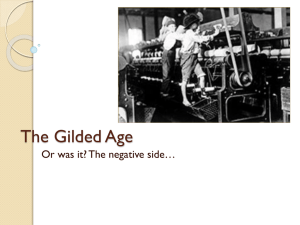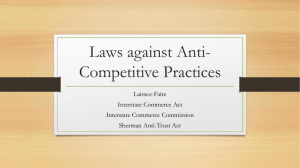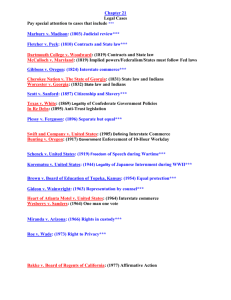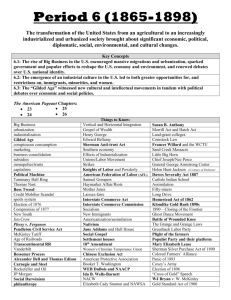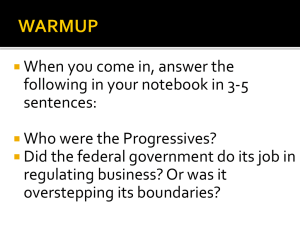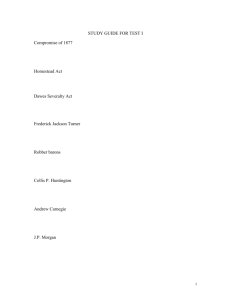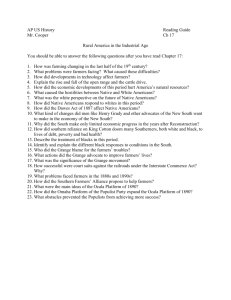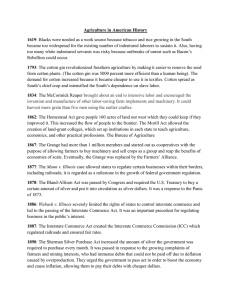From Stalemate to Crisis
advertisement
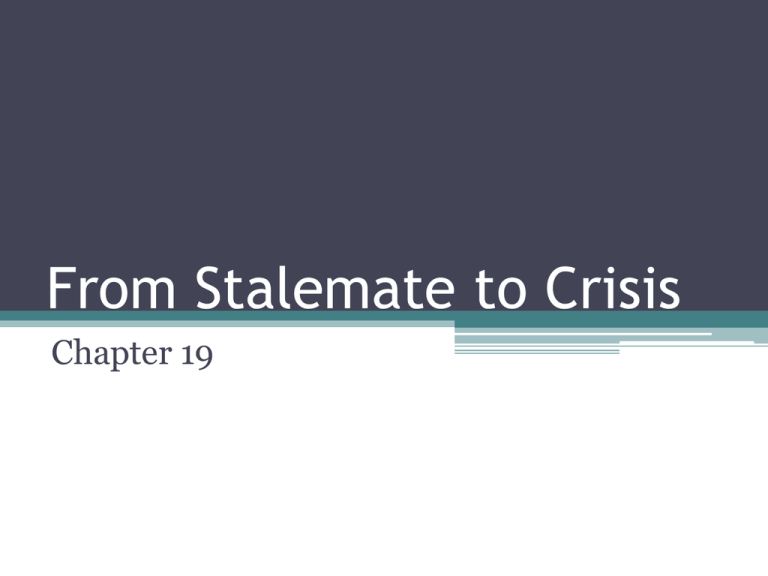
From Stalemate to Crisis Chapter 19 The Party System • Characteristics of Politics of the late 1800’s ▫ Strong, stable political party, system with very loyal voters ▫ Politicians did not address the problems caused by rapid social and economic change • Most Americans engaged in political activity (voting, donating money) because of regional, ethnic, or religious sentiments (peer pressure) ▫ Woman, blacks, poor Southern women, were potential voters who were disenfranchised by the political system The National Government • Federal government was weak with few responsibilities • Parties were more powerful then the national government • The National Government had a reputation that they did very little to help ease the growing problems of the people. What types of problems were afflicting the American People? What problems were afflicting the National Government? The National Government • The Federal Government and the President did little to help everyday people except retired veterans by paying their pension—Civil War Pension System • Public Officials were thought to be concerned only with ▫ ▫ ▫ ▫ Winning elections Controlling patronage Giving out jobs Maintaining their basis of support among voters Presidents and Patronage • The President’s main power was to appoint people to government positions ▫ 100,000 appointments to the post office alone Presidents and Patronage • The Stalwarts and the Half Breeds—two rival sub-parties within the republican party ▫ Stalwarts—lead by New York boss Roscoe Conkling Favored traditional, machine politics ▫ Half Breeds—lead by James G. Blaine of Maine Favored reform of the system ▫ Competed over control of the Republican Party ▫ Battle fought between Hayes presidency Pendleton Civil Service Act • An attempt to end Patronage by requiring all Federal Government Employees to take an exam before they could get a job with the government. ▫ Made sure people were competent and qualified ▫ It was meant to end the appointment of under qualified people to government jobs Keep people from bribing officials to get gov jobs Sherman Anti-Trust Act • Sherman Anti-Trust Act 1890 was passed to break up business trusts (monopolies) • Declared illegal any contract or trade practice that created a trust or monopoly within interstate trade. ▫ It was ineffective because: 1) it was used against labor unions 2) the courts limited the types of businesses that could be sued 3) government didn’t go after business monopolies 4) government didn’t seem motivated to enforce the act. Interstate Commerce Act of 1887 • Interstate Commerce Act of 1887 created the Interstate Commerce Commission a government agency designed regulate the railroads • Law requiring rail rates to be “reasonable”, and for railroads to file rates and schedules with the national government ▫ For 20 years it was ineffective because it was rarely enforced ▫ No one knew which government agency was supposed to support it The Grange (Granger) Movement An organization of rural farmers joining together for support First organized in the 1870s in the Midwest, the south, and Texas. Set up cooperative associations. They worked to Help distant lonely farmers make connections with other farmers Get around the middle men in crop marketing and selling Regulate railroad rates Help farmers in need. Rapidly declined by the late 1870s. Would eventually become the Populists Written by a Farmer in 1898 • When the banker says he's broke And the merchant’s up in smoke, They forget that it's the farmer who feeds them all. It would put them to the test If the farmer took a rest; Then they'd know that it's the farmer feeds them all. The Populist Movement • Political movement in the west that supported the free coinage of silver and the regulation of business • American Issues 19.1—Populist Party Platform • Supported by small farmers Causes of the Panic of 1893 Begun 10 days after President Cleveland took office. 1. Several major corporations went bankrupt. Over 16,000 businesses disappeared. Triggered a stock market crash. Over-extended investments. 2. Bank failures followed causing a contraction of credit [nearly 500 banks closed]. 3. By 1895, unemployment reached 3 million. Americans cried out for relief, but the Govt. continued its laissez faire (doesn’t care) policies!! Study Slam Chapters 19-20 Review Question 1 • Following the Civil War, the leaders of both political parties seemed most concerned with: A) resolving the dispute between protectionists and advocates of free trade. B) providing inflation of the money supply. C) curbing the growing power of big business. D) winning elections and controlling patronage. Review Question 2 The Sherman Antitrust Act of 1890 was: A) passed by a narrow margin after a long and bitter debate in Congress. B) immediately successful in halting the trend toward business monopolization. C) intended by Congress to restructure the economy. D) virtually emasculated by hostile court decisions. Review Question 3 The Interstate Commerce Act of 1887 provided for: A) nominal government supervision of the railroads, designed principally to satisfy the popular clamor for reform. B) discrimination in railroad rates between long and short hauls. C) an objective standard to determine the extent to which railroad rates were "reasonable and just." D) an Interstate Commerce Commission with a clear authority to fix railroad rates. Review Question 4 • Which of the following groups of the latter nineteenth century would not have favored an inflationary policy of "free silver" by the government? A)Bankers B) Silver miners C) Farmers D) Debtors Review Question 5 • In politics, "patronage" generally refers to: A)the tendency of politicians to talk down to the voters. B) the system of fixed bids, kickbacks, and bribes that officeholders took from constituents. C) the way that wealthy industrialists controlled the legislators. D) the process of awarding government jobs to supporters of the winning party. Review Question 6 The key issue debated in the 1888 presidential election campaign was: A) monopoly. B) tariff. C) civil service. D) race. Review Question 7 • The "ratio of 16 to 1," which was important to the politics of the 1890s, referred to: A) the number of poor people for every one middleclass person. B) the way that southern states counted African Americans for the purposes of determining congressional representation. C) the profit that railroads made for each ton carried. D) the value of silver compared to the value of gold. Review Question 8 • The new "Manifest Destiny" contrasted with the preCivil War version in that the new: A) was mostly free of the attitudes of racial and ethnic superiority that had characterized the old. B) concentrated on lands not geographically adjacent to territory already controlled by the United States. C) was patriotically motivated whereas the old was steeped in economic exploitation. D) tended to involve use of military force whereas such force had been avoided with the old. Review Question 9 • The annexation of Hawaii by the United States occurred as a result of: A) the request of American missionaries in the 1820s. B) negotiation of a treaty with King Kalakaua in 1887. C) the overthrow of Queen Liliuokalani by American businessmen in 1893. D) passage of a joint resolution by Congress in 1898. Review Question 10 • All of the following arguments were made against United States annexation of the Philippines except that: A) inferior" Asian races would "pollute" the American population. B) defense of the islands would prove costly and entangle America in foreign alliances. C) such a move would repudiate American principles of independence and self-reliance. D) control of the islands would necessitate American involvement in the Oriental trade. Things You Should Know for the Test • • • • • • • • • Political activity of the late 1800’s Political party system of the late 1800’s Reputation of the Federal Government Function of the President Stalwarts vs. The Half-Breeds Pendleton Civil Service Act of 1883 Anti-Trust Regulation Sherman Anti-trust Act of 1890 Grange Movement Things you should know for the test • • • • • • • • • Interstate Commerce Commission Interstate Commerce Act of 1887 Farmers Alliance Populist Party Platform Crisis of the 1890’s Panic of 1893 Bimetalism Sherman Silver Purchase Act William Jennings Bryan Things you should know for the test • • • • • • • • • • • American Imperialism Reason for expansion Criticism for expansion Acquisition of Hawaii Cuban Revolt Spanish-American War Causes for American involvement Theodore Roosevelt Annexation of the Philippines Philippine War Treaty of Paris
